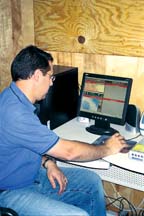Security’s Tool Maintenance Role

Instead of being carted away for expensive and environmentally detrimental disposal, the trash is delivered to the plant. There it is prepared and burned in special water tube boilers, making steam to drive the turbines that produce electricity. The resultant energy is sold to the New England Power Grid.
Unconsumed trash, usually in the form of clean, inert ash, is sent to a landfill in nearby Shrewsbury, Mass. Metal and glass are separated and recycled.
Access saves downtime
Until six months ago, there was no security system at Wheelabrator Millbury. When the new area purchasing manager looked into the matter, he was told that theft was no problem at the facility. This was, indeed, true. While the two warehouses and the maintenance shop stock a number of big-dollar items, there’s no temptation for pilferage because there’s no use or market for them.The problem was not theft, but inventory control. Downtime at the plant could cost $80,000 to $90,000 an hour, so even a relatively short outage could become a huge financial burden. At times, such outages were occurring simply because items were taken off the shelf and never properly returned.
The plant uses TABWARE software (AssetPoint, Greenville, S.C.) for inventory/procurement management, so the plant inventory, valued at $2.5 million, should have been safe enough. But there was no assurance that the items listed were actually there and available for use. Much of the warehouse stock was specialty parts, obtained with a three- or four-month lead-time, so it was critical to know where they were. And yet the new manager found many variances and no real accountability in the inventory.

Security accountability
The plant operated 24/7 with shifts continually coming on and off; any employee could walk in with a key. There was no way that Stanley Silun, the warehouse manager, could keep tabs on everything all the time. Sometimes an outage threatened simply because equipment that was needed was replaced in the wrong part of the warehouse, or was never returned to stock.
The solution was a security system to get to the root of the problem. Three system integrator companies were asked to bid, and the company selected was Electronic Security Group (ESG) of Worcester, Mass, the systems integrator for Compass Technologies (Exton, Pa.) access control and security management.

Access as needed
The system immediately achieved its desired purpose in the two warehouses, and was soon extended to the maintenance shop. The problem was not so much inventory, as it was ensuring that big-money tools were maintained in operable condition.The particular problem occurred during scheduled outages. Subcontractor personnel were not always careful about cleaning the tools they used or ensuring that necessary repairs were made. The security system would assure accountability in these and other cases.
The extended system utilized several different so-called “fast cards” for maintenance and the two warehouses. These were essentially two separate access controls tied into the same base. The security integrators also installed a video camera facing the parking lot and warehouse, which would be reviewed every morning.
The system was to keep a 15-day history of people signing in and out. History and reports could be printed out as needed. In the Millbury system, fast cards were given to the management team: each of the five shift supervisors, the maintenance manager, the lead electrician, the maintenance lead and, of course, the plant manager. Some of these people were provided an area master version that opens all access areas, some warehouse-only or maintenance shop-only. All nine maintenance employees received cards good for just the maintenance shop.
The access control system architecture chosen was a Compass 5E, PC-based client/ server, which combined simple-to-use operator screens, intelligent door controllers and flexible wiring topology to provide a powerful, scalable solution to electronic security needs.
At the same time the warehouse and shop were protected, access control was added to protect the main office. The plant is now a Voluntary Protection Program Star Site, the highest-level safety rating OSHA provides – one of perhaps a thousand such sites in the country and only 20 in Massachusetts. Presently there are no fast cards for the main office. However, ESG is working with Wheelabrator to upgrade the system to be integrated into the access control program.
Looking for a reprint of this article?
From high-res PDFs to custom plaques, order your copy today!




